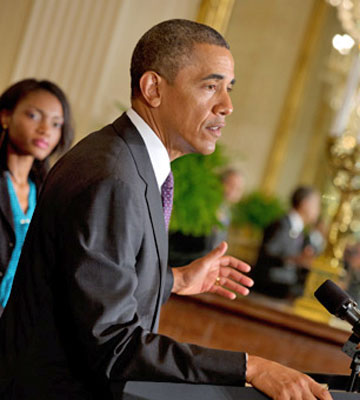
by Dean Baker
12 June 2013
from
Truthout Website
|
Dean Baker is a macroeconomist
and co-director of the Center for Economic and Policy Research
in
Washington, DC.
He previously worked as a senior economist at the
Economic Policy Institute and an assistant professor at Bucknell
University. |

Barack Obama speaks during a
news conference
in the East Room of the White
House.
(Photo: Stephen Crowley / The
New York Times)
As part of its overall economic strategy
the
Obama administration is rushing full speed ahead with two
major trade deals:
There are two key facts people should know about
these proposed trade deals.
-
First, they are mostly not about trade.
-
Second they are not intended to boost
the economy in a way that will help most of us.
In fact, it is reasonable to say that these
deals will likely be bad news for most people in the United States.
Most of the people living in our partner
countries are likely to be losers too.
On the first point, traditional trade issues, like the reduction of import
tariffs and quotas, are a relatively small part of both deals. This is the
case because these barriers have already been sharply reduced or even
eliminated over the past three decades.
As a result, with a few notable exceptions, there is little room for further
reductions in these sorts of barriers. Instead both deals focus on other
issues, some of which may reasonably be considered barriers to trade, but
many of which are matters of regulation that would ordinarily be left to
national, regional, or even local levels of government to set for
themselves.
One purpose of locking regulatory rules into a
trade deal is to push an agenda that favors certain interests (e.g. the
large corporations who are at the center of the negotiating process) over
the rest of society.
Both of these deals are likely to include restrictions on the sorts of,
...that can be imposed by the
countries that are parties to the agreements.
While many of the regulations
that are currently in place in these areas are far from perfect, there is
not an obvious case for having them decided at the international level.
Suppose a country or region decides that the health risks posed by a
particular pesticide are too great and therefore bans its use. If the risks
are in fact small, then those imposing the ban will be the primary ones who
suffer, presumably in the form of less productive agriculture and higher
food prices.
Is it necessary to have an international
agreement to prevent this sort of "mistake?"
As a practical matter, the evidence on such issues will often be ambiguous.
For example, does
fracking pose a health hazard
to the surrounding communities? These agreements could end up taking control
of the decision as to whether or not to allow fracking away from the
communities who would be most affected.
In addition to limiting local control in many areas these trade deals will
almost certainly include provisions that make for stronger and longer
copyright and patent protection, especially on prescription drugs. The
latter is coming at the urging of the U.S.
pharmaceutical industry, which
has been a central player in all the trade agreements negotiated over the
last quarter century.
This is likely to mean much higher drug prices
for our trading partners.
This is of course the opposite of free trade. Instead of reducing barriers,
the drug companies want to increase them, banning competitors from selling
the same drugs. The difference in prices can be quite large.
Generic drugs, with few exceptions, are cheap to
produce. When drugs sell for hundreds or thousands of dollars per
prescription it is because patent monopolies allow them to be sold for high
prices.
If these trade deals result in much higher drug prices for our trading
partners, the concern should not just be a moral one about people being
unable to afford drugs.
The more money people in Vietnam or Malaysia
have to pay Pfizer and Merck for their drugs, the less money they will have
to spend on other exports from the United States. This means that everyone
from manufacturing workers to workers in the tourist sector can expect to
see fewer job opportunities because of the copyright and patent protection
rules imposed through these trade deals.
To see this point, imagine someone operating a fruit stand in a farmers'
market.
If the person in the next stall selling meat has
a clever way to short-change customers, then his scam will come at least
partly at the expense of the fruit stand. The reason is that many potential
fruit stand customers will have their wallets drained at the meat stand and
won't have any money left to buy fruit.
The drug companies' efforts to get increased patent protection, along with
the computer and entertainment industries efforts to get stronger copyright
protection, will have the same effect. Insofar as they can force other
countries to pay them more in royalties and licensing fees or directly for
their products, these countries will have less money to spend on other goods
and services produced in the United States.
In other words, the short-change artist in the
next stall is not our friend and neither are the pharmaceutical, computer,
or entertainment industries.
However these industries all have friends in
the
Obama administration. As a
result, these trade deals are likely to give them the protections they want.
The public may not have the power to stop the high-powered lobbyists from
getting their way on these trade pacts, but it should at least know what is
going on.
These trade deals are about pulling more money
out of their pockets in order to make the rich even richer.

